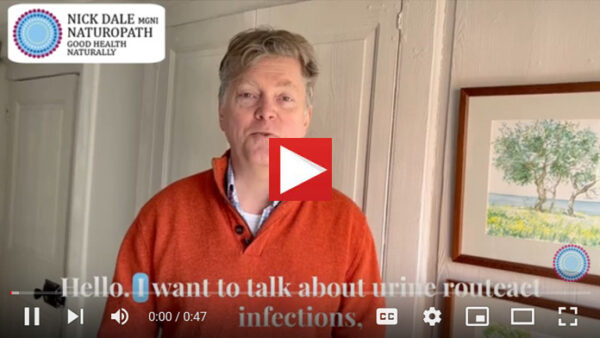Natural Treatment for Interstitial Cystitis, and Repetitive or Chronic UTI
Identifying and treating the underlying factors allowing a bacterial infection to take hold is key. Predisposing factors range from embedded infections, biofilms and poor immune function to overuse of antibiotics and leaky gut.

“Nick really is amazing at what he does and I cannot thank him enough for everything he has done with my health journey.
I had been suffering with chronic cystitis that would not go away.. it was mentally draining for me and incredibly upsetting and painful, something you never think would happen to you..
I found Nick online searching for a naturopathic doctor at my wits end after being told by countless gynecologists and a urologist that antibiotics were my only solution, after trying around 6 different antibiotics my body was not responding and it continued to come back weekly.. I was getting cold sores, my skin was getting bad, clearly because my body was so run down
I felt I had nothing to lose and put my full trust in Nick to try and help me get better.
He put together for me a program which consisted of different supplements to be taken every day which I have been taking the last 3 months, the cystitis I’d say took around 3-4 weeks to go away, and the symptoms I was experiencing fully subsided in around 2 months..
Nick has been really great and offered me some great advise when I needed help or when I was worried about slight symptoms coming back.. I really could not recommend him enough!
– Rach H
Negative culture but relentless UTI symptoms
Interstitial cystitis came on my radar when a family member of mine had a UTI, diagnosed with a positive culture, following a period of prolonged stress. After taking a course of antibiotics from her GP the symptoms of the UTI remained. So, another culture was taken, only this time it came back negative for infection. She was simply told there was nothing wrong. However, she was in pain and rushing to the bathroom every 20 minutes, whereas before her UTI there were no problems at all. Clearly, something was wrong.
People get in touch with me, mostly because of ongoing symptoms despite having used short or long-term antibiotics.
If you are suffering from repetitive or chronic UTI symptoms, I understand how painful and debilitating it can be. The pain, burning, abdominal ache, frequency and nausea are all very difficult to live with, especially if this becomes chronic.
When IC comes about, it is a warning light that your body needs help and attention. Making the decision to treat this condition by peeling back the layers that have caused it to come about will help to free you of the debilitating and life changing condition. What’s more, it will help set you on the path to good health generally, which in turn leads you enjoy a full and happy life.
If you are interested to find out more, call 01379 307707 to discuss further.
Hear from my clients
“After enduring relentless frequency and achy pain for months, Nick found out what the problem was, which was such a relief. He gave me supplements to help relieve the problem as well as a program to treat it. I’m pretty much back to myself now, which I’m so grateful for. With the things I had read online I was really worried I wouldn’t get better, and my GP didn’t think there was anything wrong with me because the UTI tests came back negative. I’m so glad Nick was able to give me answers, thank you Nick.”
– Mary



